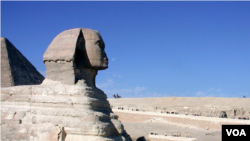Citing security concerns, Egypt’s government is introducing tougher restrictions on foreign visitors, requiring independent travelers to obtain visas at embassies before traveling instead of paying for them on arrival. Industry experts predict the change will impact the country’s already struggling tourism industry.
Egyptian officials say the scrapping of on-arrival visas for visitors not traveling with package tour operators is needed to give their intelligence services more time amid an Islamist insurgency to assess those who want to visit. Officials say also they want to prevent jihadist recruits using Egypt as a transit point for travel on to Syria and Iraq to join the Islamic State or al-Qaida groups.
Western security sources and rights activists say they suspect the shift is also intended to help block visits by Western human rights advocates, democracy activists and journalists, who have criticized the government’s harsh crackdown on liberal and Islamist dissidents. Egyptian authorities are increasingly denying foreign human rights activists entry to the country.
Local media outlets have reported the intelligence services are expanding security watch lists to include NGO workers and scholars who are critical of the government.
In December, Egyptian authorities at the Cairo airport turned away former U.S. diplomat Michele Dunne, an analyst with the Washington, DC-based research institution the Carnegie Endowment, arguing she should have entered the country on a business visa rather than on an airport-purchased tourist one.
Other American NGOs, research institutions and democracy groups say that in the past few months, they too have experienced increasing problems getting their people into the country. At least three U.S. democracy activists have been refused entry this year even when arriving at Cairo on business visas issued by the Egyptian embassy in Washington prior to travel, says a U.S. State Department official, who asked not to be identified for this article.
For years, tourists arriving from Europe, the Americas and most Gulf countries have been allowed to arrive at Egypt’s airports and pay a fee to get their passports stamped with a visa. In the past, Egyptian authorities have ignored foreign businessmen, journalists and NGO workers using the same streamlined procedure to use on-arrival tourist visas.
Under the new rules that will be introduced in May, tourists traveling with registered tour operators and planning to stay less than 15 days will get a free visa on arrival, says a spokesman for the state tourism agency.
Egyptian officials insist the change will have little impact overall on tourism. “For tour groups everything remains unchanged - they can obtain visas at airports, but individuals have to get prior approval from embassies,” Foreign Ministry spokesman Badr Abdelatty said.
According to the Foreign Ministry, 90 percent of all tourists to the country visit with travel operators.
Industry experts dispute that figure, arguing 15 to 20 percent are lone travelers. Last year, Britain’s low-cost airline EasyJet had a capacity of nearly 400,000 seats for travelers to the Egyptian cities of Hurghada and Sharm el-Sheikh, none were booked by tour operators. The company is in talks with Egyptian authorities. The budget airline has seen its share price fall in recent weeks due to losses partly caused by a decline in tourism to Egypt.
Tourism is a significant contributor to the Egyptian economy, once attracting large numbers to the pyramids, Luxor and Aswan along the Nile, and to the Red Sea resorts. Since the 2011 ouster of President Hosni Mubarak, tourism has slumped. Last year, 10 million tourists visited the country, down from 14.7 million in 2010, when tourism accounted for 11 percent of gross domestic product and employed four million people.
Prospects for a revival of tourism weren’t helped last year when three South Korean tourists were killed in a 2014 suicide bombing in the resort town of Taba on the border with Israel.
Earlier this month at an international investment conference in the Red Sea resort of Sharm El-Sheikh, Khaled Ramy, Egypt’s tourism minister, said the country is aiming to generate $20 billion in revenue from tourism by 2020. The goal is to double the number of tourists to 20 million a year to revive a sector crucial for shoring up state coffers.
The new regulations, however, may hinder reaching that goal, warns Anthony Sattin, a travel writer for Britain’s The Daily Telegraph newspaper. Writing in the newspaper, he warned securing visas could be time-consuming and applicants are likely to be frustrated by the short opening hours of the Egyptian consulates, which are ill-prepared for the influx of applications. “It will certainly do nothing to attract the extra 10 million annual visitors that the minister of tourism is currently chasing.”
The tourist visas obtained from consulates will also be more expensive than the $25 on-arrival fee. In an online straw poll conducted by the newspaper, nearly 40 percent of respondents said the change would deter them from visiting Egypt and another 23 percent said they are altering their plans to visit because of the new requirement.




